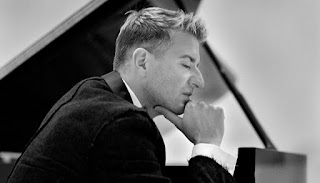ISO Classical Series gets under way with sparkling Gershwin, deep-delving Tchaikovsky
 |
| Jean-Yves Thibaudet is fully engaged with Gershwin's Concerto in F. |
It's hard to imagine, especially with the ISO's scintillating performances Friday evening of Gershwin's Concerto in F and Tchaikovsky's Symphony No. 5 in E minor, just what vexed their creators.
But Tchaikovsky wrote that he felt he had to prove with the work that he wasn't played out as a composer, and he allowed that maybe the resulting symphony had merit. After its premiere, however, and a performance he conducted in Prague, the always self-censorious composer said "there is something repulsive about it."
Gershwin, by contrast, had a background in popular music to overcome (in the minds of some, including hidebound critics). His earlier "crossover" hit, "Rhapsody in Blue," had not been orchestrated by him, so he studied hard to learn the technique for his more ambitious three-movement concerto. Even his forte — writing memorable melodies — was in doubt: In retreat at Chatauqua, N.Y., in July 1925, he wrote a friend that he was "praying...to the God of Melody to please be kind to me and send me some hair-raising 'blues' for my second movement."
 |
| Mondrian's "Broadway Boogie-Woogie" |
Thibaudet has a knack for the American vernacular, particularly the interplay between jazz and classical piano. He has issued a stunning CD with interpretations of the music of Bill Evans, a venerated jazz master. The accents characteristic of Gershwin can be neither slighted nor pounded out to deliver an idiomatic performance of the Concerto in F. And Thibaudet's touch seemed just right for the piece; nor did he short-change the tender and filigreed passages.
The coordination between keyboard and podium was spiffy at all points. The finale, which the composer described as "an orgy of rhythms," had all its roiling energy in place. The pulsating mosaic moved with both energy and logic, in the manner that those brightly colored squares seem to move in Piet Mondrian's famous painting "Broadway Boogie-Woogie."
Astonishingly, a member of the august New York critical community named Lawrence Gilman found the concerto "conventional, trite... a little dull." The New York Times' Olin Downes was even harsher, but I bet the most hurtful response to the high-energy composer was to have his music called dull.
Some classical musicians were likewise unimpressed. An account of Gershwin's meeting with the Russian composer Alexander Glazunov after the premiere of Concerto in F was a blow to the American's ambition. Through an interpreter, Gershwin expressed an interest in studying orchestration with Glazunov, who responded in a way the interpreter couldn't bear to translate: "He wants to study orchestration, but he knows nothing about counterpoint." No Glazunov-Gershwin lessons ever happened.
Glazunov had a point: The accompaniment throughout Concerto in F is long on color and rhythm, somewhat deficient in providing independent lines that fit with the main material. No such charge can be leveled against another consummate tunesmith, Glazunov's eminent countryman Tchaikovsky. Though Glazunov's personal loyalty was to Nikolai Rimsky-Korsakov, all Russian composers knew how much the international stature of their music was linked to Tchaikovsky, particularly the lyrical component.
You can hear, for example, such contrapuntal richness between the two appearances of the "Fate motif" in the second movement, just how much attention Tchaikovsky lavished upon detail that was more than ornamental. Urbanski drew from the orchestra a high degree of definition to all the score's treasures. Though attention is properly focused on such glories as the French horn solo, which Robert Danforth played with a full-blooming security Friday night, there is so much more to admire.
The Fate motive, especially when it ascends to unprecedented heights in the finale, is sometimes taken as a sign of Tchaikovsky's submission to an implacable force of largely negative significance. I rather hear it in terms of his being reconciled to something that goes beyond the individual will and experience. In this respect then, the ghostly appearance of that motif near the end of the third-movement waltz carries notes of reconciliation and quiet acceptance.
The Fifth Symphony was introduced to the world in November 1888. Maybe Tchaikovsky found "repulsive" having to submit to the Fate he holds up so magnificently in the E minor symphony. But Fate was for him something like Robert Frost's "My November Guest." The first and last stanzas of that early poem are germane to how we can profitably sink into the atmosphere of Tchaikovsky's Fifth.
My Sorrow, when she's here with me
Thinks these dark days of autumn rain
Are beautiful as days can be;
She loves the bare, the withered tree;
She walks the sodden pasture lane.
...
Not yesterday I learned to know
The love of bare November days
Before the coming of the snow,
But it were vain to tell her so
And they are better for her praise.
Tchakovsky's Fate, like Frost's Sorrow, is a companion that allows the artist to deal with bleakness by finding it better and more beautiful than previously thought. And that greater purpose can be usefully extended to us as well, especially through splendid performances. The praise of a creator's companion pain can mysteriously result in the reader's or listener's pleasure.



Comments
Post a Comment